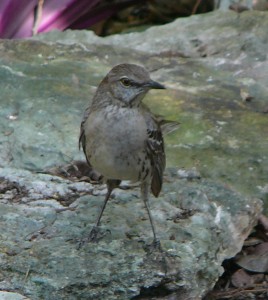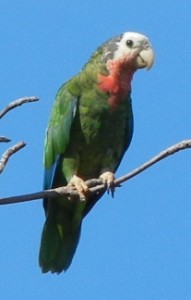
Carolyn Wardell
Vancouver, CANADA – Led by the Sustainable Tourism Unit and with the support of Small Planet Consulting, The Bahamas Ministry of Tourism recently launched their first-ever birding tourism development plan. The preparation of the plan was championed by Earlston McPhee, head of the Sustainable Tourism Unit. McPhee is well known for his work for over 25 years in promoting sustainable tourism development in the Caribbean and around the world.
The Bahamas depends heavily on its natural environment and has taken many steps to protect it. The country is one of the first in the world to establish a Sustainable Tourism Unit (STU), which initiated the development of the Bahamas Sustainable Tourism Development policy guidelines. The guidelines resulted in two Green Globe Environmental Achievements Awards from WTTC in 1996 and 1998. The Bahamas has long practiced sustainable management of public lands,
Dr. Rick Wright
The Bahamas offers birdwatchers over 340 bird species, including about 110 species that breed in the country, over 170 migrant species and 50 rarely occurring vagrant species. There are 28 species that are not seen in the U.S., Canada or Europe. Most importantly, five of these species are endemic to the country – the Bahama Woodstar, Bahama Swallow, Bahama Warbler, Bahama Yellowthroat and Bahama Oriole.
Recognizing the potential of the commonwealth’s birding tourism assets and of sustainable birding tourism development, in 2009 the Sustainable Tourism Unit collaborated with the Bahamas National Trust, the agency responsible for the protection of the country’s natural and historical resources, to develop a fully accredited birding tour guide course. In 2011, the STU’s next step was to engage Judy Karwacki of Small Planet Consulting to assist with the preparation of a birding tourism development plan. Small Planet has assisted many destinations with wildlife and bird watching tourism product development and marketing, and is recognized for playing a key role in taking Guyana, SA, from a virtual unknown to one of the hottest destinations for birding tourism in the span of just a few years.
Following the completion of the birding tourism development plan, Small Planet assisted The Bahamas in implementing the first initiative of the plan. This was a birding product testing and familiarization trip for Dr. Rick Wright, a well-known U.S. birding tourism professional. Among other roles, Dr. Wright has served as the editor of the American Birding Association’s Winging It monthly newsletter and as department editor for their Birding magazine. He was formerly Managing Director of WINGS, one of the oldest and best known birdwatching tour companies in the world.
At the end of the product testing and familiarization trip, Dr. Wright confirmed that The Bahamas has everything it takes for a country to be a first-class birding destination and stated: “Everywhere you look there are birds, and birds in a wondrous combination of the familiar and the exotic and new. But best of all, there are birders to show them to you and to enjoy them with you. I can’t imagine a better place to spend a couple of weeks than The Bahamas.” Dr. Wright also stated that WINGS will be running a new birding tour to The Bahamas in November 2013, and he is writing an article about birding in The Bahamas for Winging It, to be published in 2013.
Along with the successful completion of the first trip, The Bahamas is now ramping up to implement additional familiarization trips and other key initiatives set out in the new birding tourism development plan. The Ministry of Tourism is actively seeking partnerships with international birding tour operators and media and welcomes all inquiries from interested partners. Meantime, Small Planet welcomes inquiries from destinations seeking to establish or expand their sustainable birding tourism programs.
